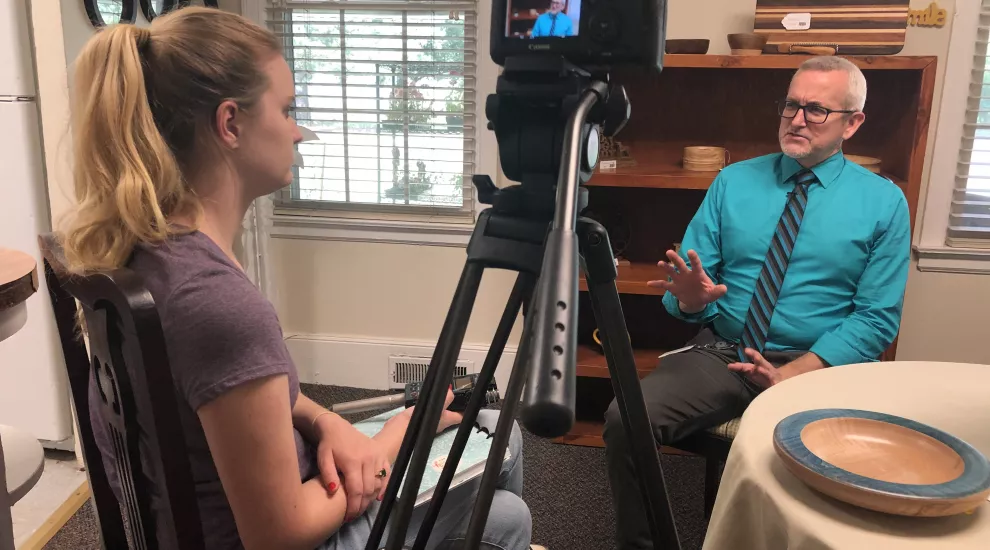
The past few weeks have probably been the most hectic weeks of the summer. The whole time we have been preparing for two significant events, a trip to the Department of Juvenile Justice (DJJ), and York County's Chasing the Moon event. At DJJ, we are highlighting their school, Birchwood, and what it is like to teach students in jail. We are also adding a new installment of Made Here, with a focus on DJJ's Store of Hope, which sells products that students have made through the work-study programs. During the Chasing the Moon event, we were tasked with interviewing the panelists to get a more in-depth look on their findings and to allow those who could not attend to learn about the panelists.
Just like every story, I started with research. Unfortunately, it was challenging to research the inner workings of DJJ. Thankfully, I was allowed to spend two days, a couple of weeks ago, observing school, and talking to teachers and students. I prepared to report with the mindset that I was going to share the facts and expose society to a different view of the world. I wanted to make people see the students who made a mistake in one story and help people understand the necessity of transportation in another. I did not prepare myself for the emotional impact DJJ would have on me.
Entering Birchwood was like entering any other school. I knew that the experience would be more emotional than stories I had covered before, but I did not expect to leave exhausted and on the verge of tears after my first visit. I interviewed students and teachers for hours, observing a school day, and asking questions. I found that I was utterly ignorant of the world in which these kids live. One group of kids liked my red fingernail polish, and another group wished it were blue. After five minutes of conversation about fingernail polish and favorite colors, I realized that they were showing their alignments and loyalties, and did not care what color was on my fingers. An hour of conversations about gang life left me devastated. I realized the closest thing in my life that I could relate to a gang was sororities and fraternities, which is still nothing close to a gang.
The original plan was for my first visit to DJJ to be my only visit to DJJ. I was going to go and get as much information as possible and compose my story. When plans fell through and my weekend became a time for observation, I was disappointed. However, this became a great gift. In hindsight I know I was ill-prepared to report on the school, its teachers, and its students. I still feel ill-prepared, despite having spent over twenty hours in the school and gathering multiple interviews, on and off the record.
So many of the people we spoke with relayed the message of hope, redemption, and second chances. I think we often label people and forget that they can change. The students we saw and spoke with were just kids, no different from myself or my friends. They are just kids that got caught. They're just kids that are changing and growing at a different pace.
Amid working on stories about DJJ, we prepared for interviews at York County's Chasing the Moon event. Mostly, I spent my time researching the event's speakers for our interviews with them. While I am used to researching interview subjects, I've never prepared an interview with anyone as high profile as our panelists. While it gave me plenty of material to work with, an abundance of material created its problems. Maj. Gen. Charles Bolen and Pranvera Hyseni were particularly exciting for me. Though they both had vastly different paths to greatness and vastly different accomplishments, they both had stories of overcoming significant obstacles to achieve greatness. Bolden, NASA's first African American Administrator, a former astronaut, and marine told us that he never imagined he could be an astronaut because of his race. Ultimately he completed four space flight and ran NASA for nine years. Hyseni, a 23-year-old amateur astronomer from Kosovo, discussed how she had to teach herself astronomy because when she fell in love with the science, her country did not even have a telescope. Now she's the founder of Kosovo's only astronomy outreach program, and they have been given a 14-inch telescope to go in the countries new observatory.
Not being a science person, I found it challenging to come up with questions for interviews, but it was so exciting to see the passion everyone had for their craft. Dr. Varsha Kulkarni is a professor of physics and astronomy at the University of South Carolina and researches the chemical and structural evolution of galaxies. Going into her interview, I was not sure what to expect, because I had never heard of people studying the evolution of galaxies. Thankfully, Dr. Kulkarni loves her work and was able to talk about it without many questions passionately.
Overall I am happy these events are behind us so that I can breathe. Now, I hope I can do justice to my interview subjects with my stories.